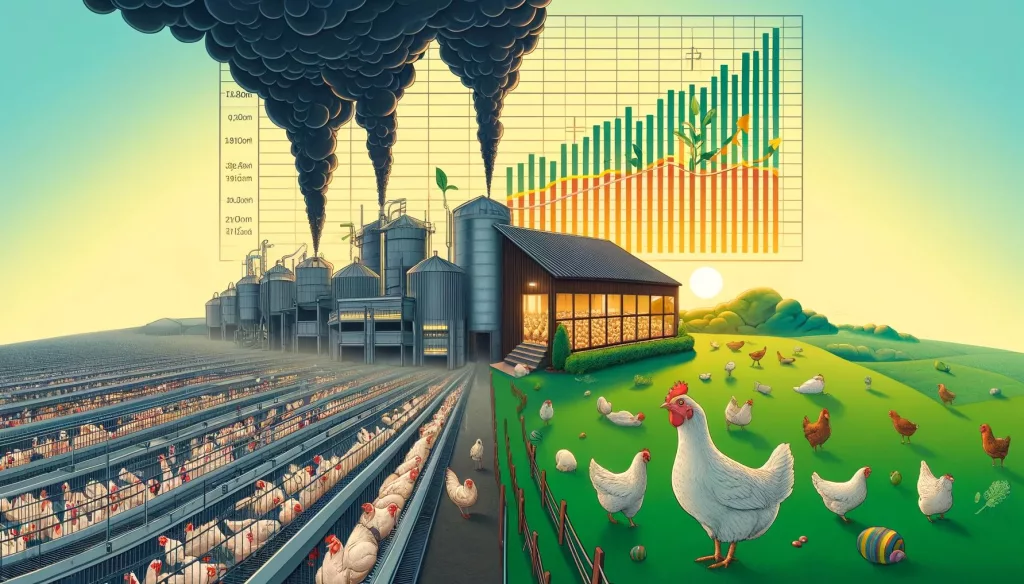Easter Eggs – Big Business for Egg Farmers?
Easter is traditionally a period of heightened activity for egg farmers, as the demand for eggs surges due to the holiday’s customs and culinary traditions. This seasonal spike can indeed translate into big business for egg producers, but it’s also a period that highlights the broader economic, environmental, and ethical challenges facing the egg farming industry.

Economic Impact
The period leading up to Easter sees a significant rise in egg prices, reflecting the increased consumer demand. In recent years, egg prices have climbed substantially around the Easter season. For instance, a dozen large Grade A eggs reached $2.01 compared to $1.60 per dozen the previous year, marking a 25.5% increase. This trend is a boon for egg farmers, who can capitalise on the higher prices. However, the industry is also facing challenges from the ongoing threat of avian influenza, which has led to the culling of millions of commercial chickens and turkeys, including egg-laying hens, in efforts to control the spread. Such outbreaks can devastate egg production capacity and lead to even higher prices due to reduced supply, underscoring the vulnerability of egg farmers to disease outbreaks.
Environmental Considerations
The transformation of the egg industry from small-scale operations to large, intensive farms has raised significant environmental concerns. The United States, for example, produced 5.4 million tons of eggs, with India, Japan, and Mexico also contributing millions of tons to the global supply. This massive production scale is achieved through technological advancements and a push for efficiency but comes at a cost to the environment.
The environmental footprint of intensive egg production includes the emission of greenhouse gases such as methane, nitrous oxide, and ammonia from manure waste. Ammonia, in particular, can cause water and land toxicity when not properly managed. Moreover, the production and transportation of chicken feed contribute significantly to carbon dioxide emissions, further exacerbating the environmental impact.
Ethical and Welfare Concerns
Intensive farming practices have also raised concerns about the welfare of laying hens. The majority of egg-laying hens in the United States are kept in battery cages, which restrict their movement and can lead to stress and physical health problems. Despite some farms adopting free-range housing systems, the cramped conditions of battery cages remain prevalent. The European Union banned the use of battery cages in 2012, highlighting the ethical concerns associated with intensive egg farming.
The Way Forward
As consumers become more aware of the environmental and ethical implications of egg production, there is a growing demand for eggs from free-range and organic systems. These systems are perceived as more humane and environmentally friendly, although they also come with higher production costs. To mitigate the environmental impact of egg production, the industry is exploring environmental technologies and sustainable practices. Consumers can play a role in supporting more sustainable egg farming practices by choosing eggs from sources that prioritise animal welfare and environmental sustainability.
In conclusion, while Easter represents a significant opportunity for egg farmers to capitalise on increased demand, it also brings to the fore the complex challenges facing the industry. From economic vulnerabilities due to disease outbreaks to environmental and ethical concerns, the egg farming industry is at a crossroads. The path forward will likely involve a balance between meeting consumer demand, ensuring animal welfare, and mitigating environmental impact.
You may have an interest in also reading…
Asian Development Bank: Towards a Blue Deal to Restore the World’s Oceans
Investments in recovering and maintaining a functioning marine ecosystem can form the foundation of a sustainable “blue economy.” Marine ecosystems
Global Investing: Italy or Singapore?
Many European countries have declining population growth and onerous business regulations. This creates a headwind against the region’s share prices.
Young Guns: How Business Prodigies are Rewriting the Rules of Success
Forget grey hairs and decades of experience. A new generation of entrepreneurs is proving that age is no barrier to


















































































